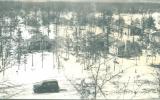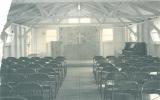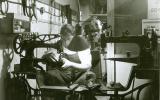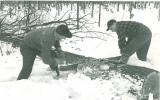CPS Unit Number 042-01
Camp: 42
Unit ID: 1
Operating agency: BSC
Opened: 6 1942
Closed: 9 1946
Workers
Total number of workers who worked in this camp: 633
-
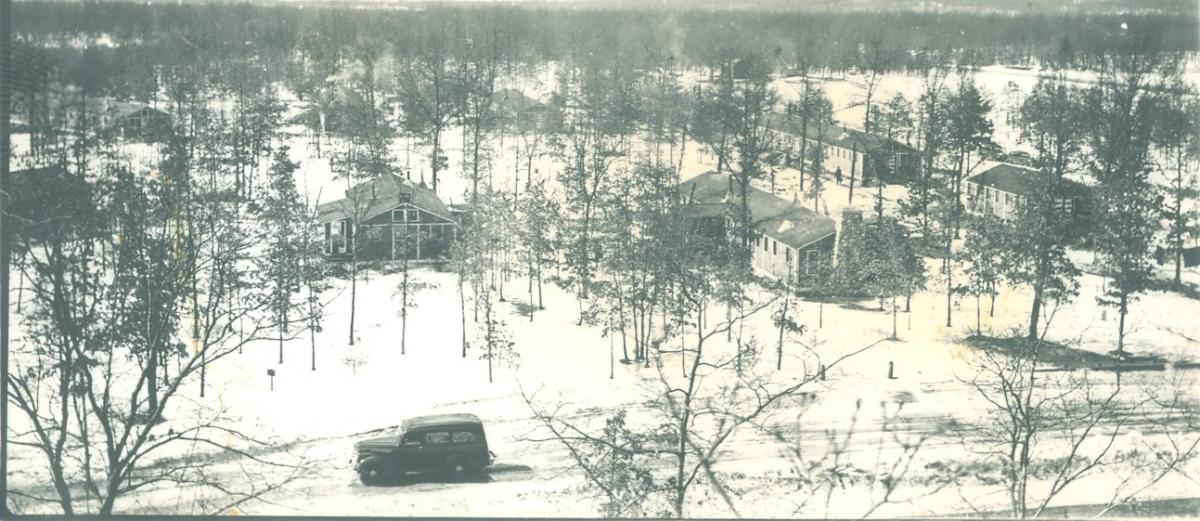 CPS Camp No. 42CPS Camp No. 42. Aerial view of the camp.Brethren Historical Library and Archives
CPS Camp No. 42CPS Camp No. 42. Aerial view of the camp.Brethren Historical Library and Archives -
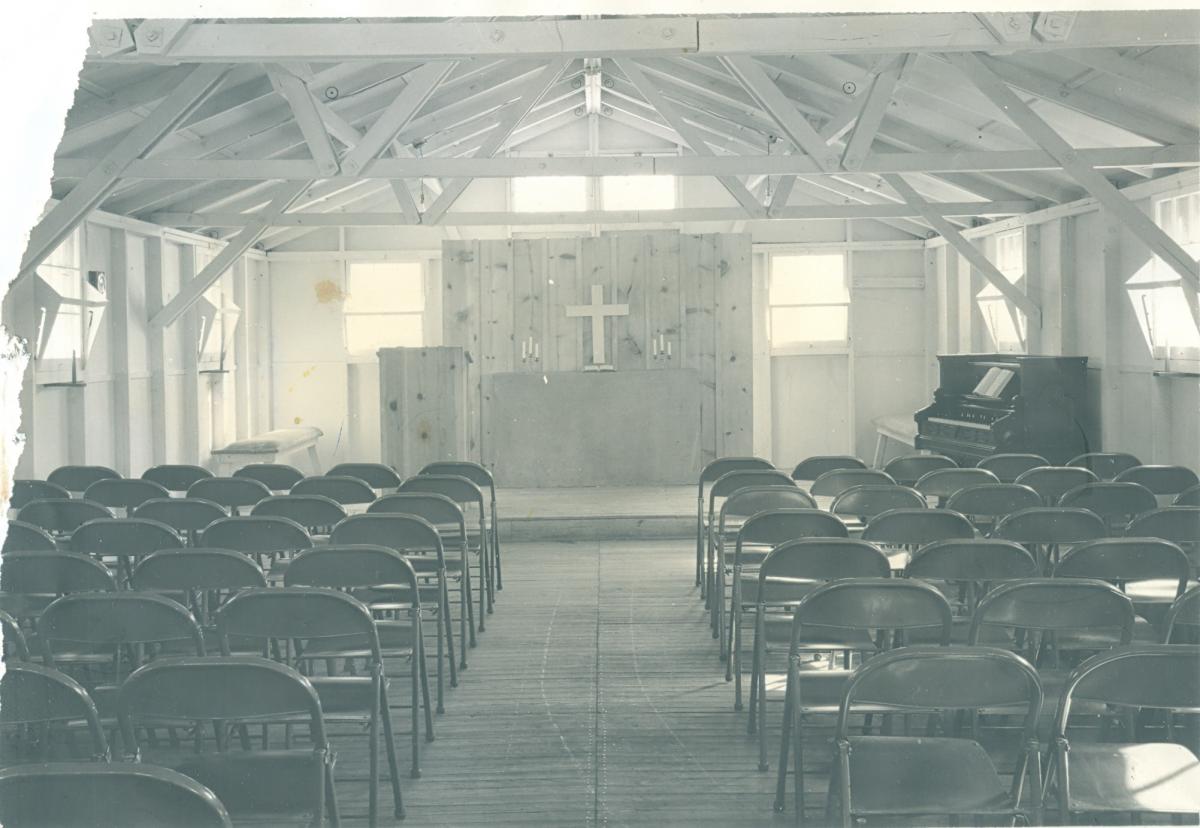 CPS Camp No. 42CPS Camp No. 42. Chapel.Brethren Historical Library and Archives
CPS Camp No. 42CPS Camp No. 42. Chapel.Brethren Historical Library and Archives -
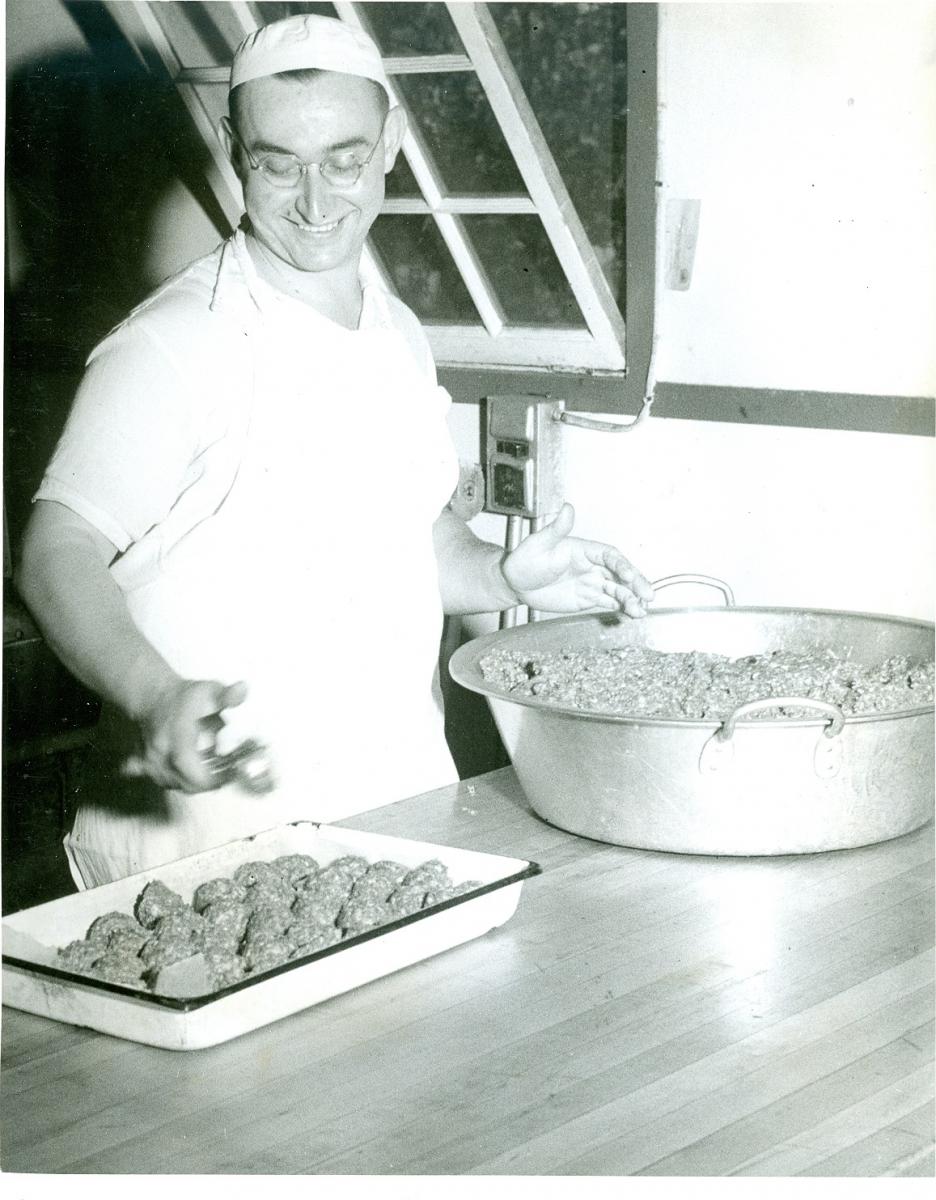 CPS Camp No. 42CPS Camp No. 42. Chef Don Smeltzer.Brethren Historical Library and Archives
CPS Camp No. 42CPS Camp No. 42. Chef Don Smeltzer.Brethren Historical Library and Archives -
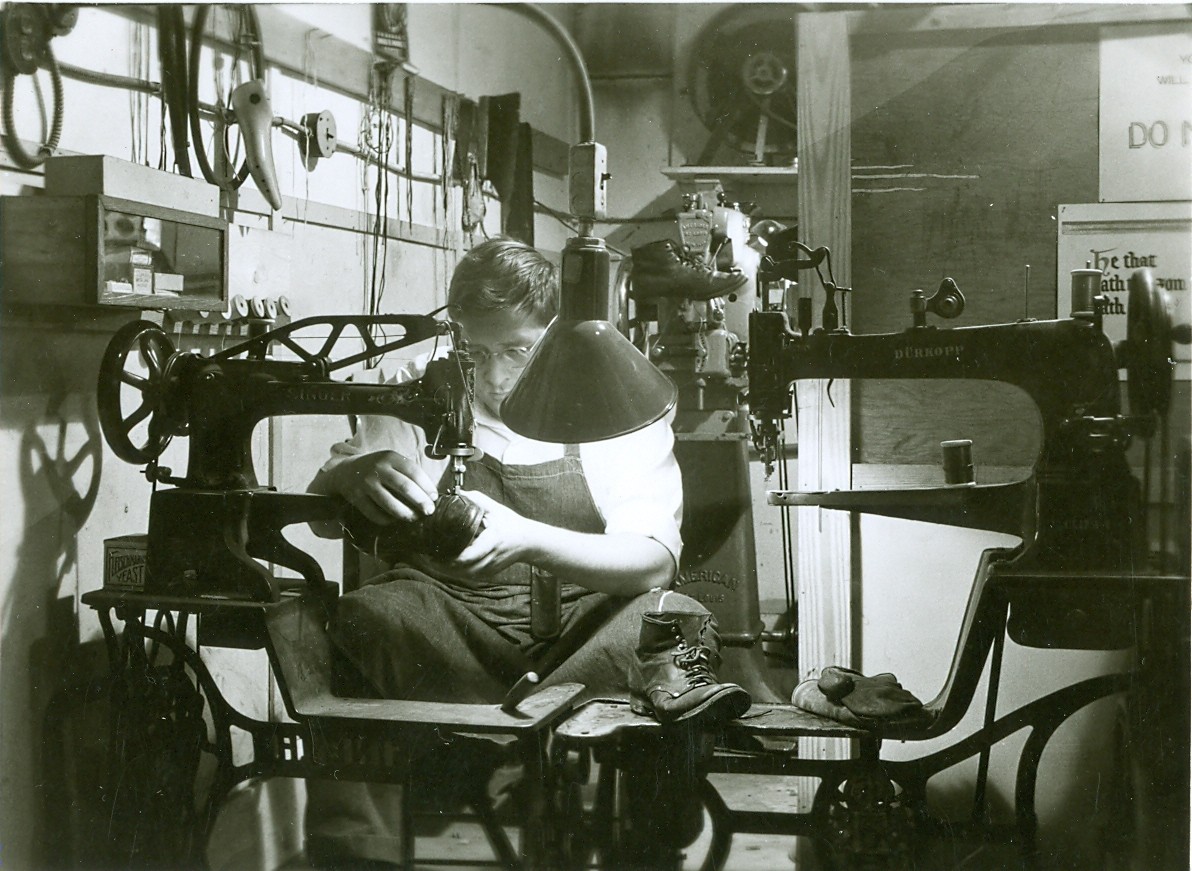 CPS Camp No. 42CPS Camp No. 42. CPS man working in shop.Brethren Historical Library and Archives
CPS Camp No. 42CPS Camp No. 42. CPS man working in shop.Brethren Historical Library and Archives -
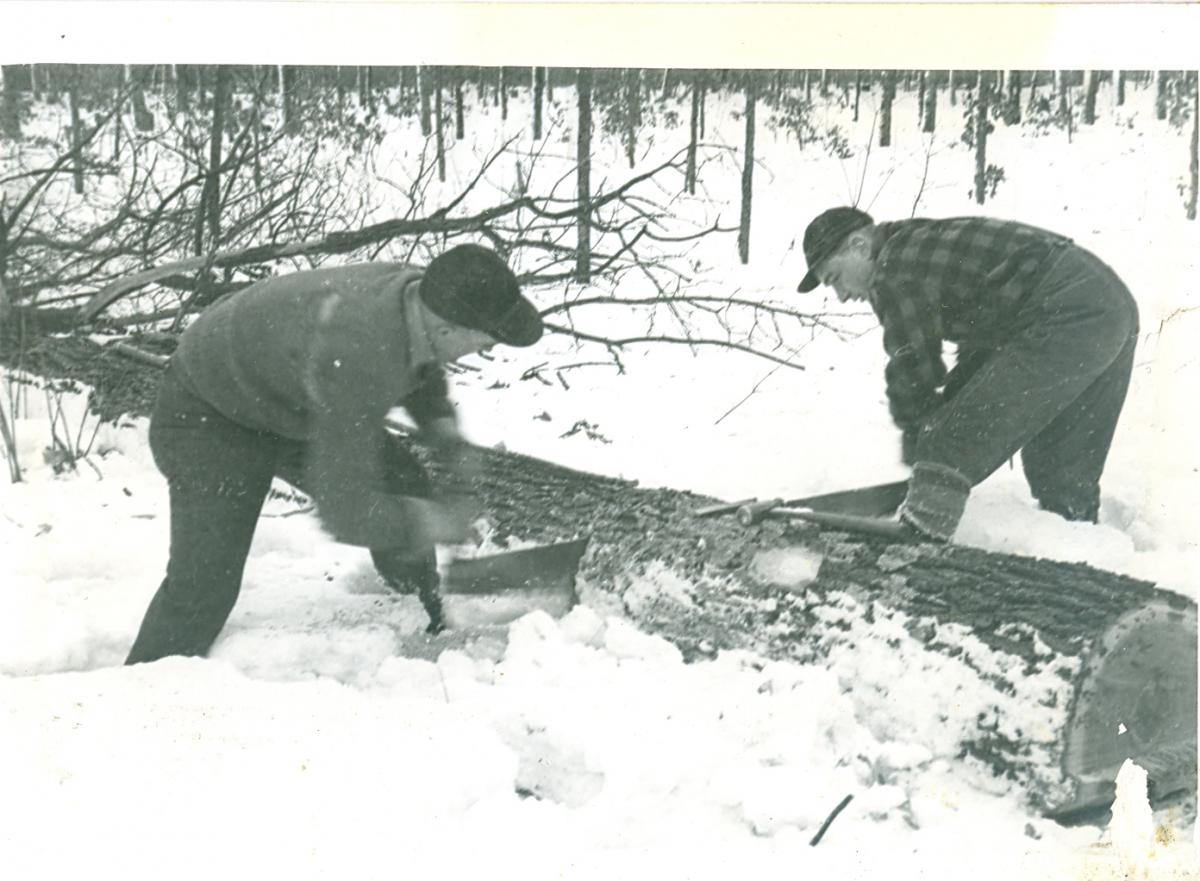 CPS Camp No. 42CPS Camp No. 42. Two CPS men cutting wood.Brethren Historical Library and Archives
CPS Camp No. 42CPS Camp No. 42. Two CPS men cutting wood.Brethren Historical Library and Archives
CPS Camp No. 42, a Forest Service base camp opened in Wellston, Michigan in June 1942, when CPS Camp No. 17 at Stronach, Michigan closed. The Brethren Service Committee operated the camp until it closed in September 1946. The men fought fires, engaged in fire prevention as well as maintenance and preparation of equipment for fighting fires.
CPS No. 42 opened when CPS No. 17 Stronach, also known as Camp Manistee, closed. When CPS No. 30 at Walhalla closed, a number of the men moved from there to Wellston.
Directors: Lloyd Blickenstaff, Graham Hodge, William Cline, Earl Garver, William Tittle, Eugene Palsgrove
Men in Brethren camps, when entering CPS tended to report a mix of religious affiliations, with about half citing the Brethren denomination.
Men in Brethren camps also reported on entry into CPS a variety of occupations. On average, they had completed 12.22 years of education, with nearly forty percent having enrolled in or graduated from college, with some enrolled in graduate or postgraduate work. (Sibley and Jacob p. 171-72)
In all likelihood, some of the men in this unit were married, given their interest in revisions in policies for agricultural work. See discussion under Camp Life.
The men fought fires, and performed fire prevention duties. They maintained and prepared equipment for fighting fires.
At Wellston, the men devoted significant effort to reforestation. “. . . In two years, the men in Wellston set out over 1,566,000 red and white pine trees covering approximately 1,426 acres.” (figures from P. S. Newcomb, Forest Supervisor, Lower Michigan National Forests, June 30, 1947 in Eisan p. 83.) The work increased the number of tracts of land in fuller use.
Men also surveyed the forests, becoming trained as “timber cruisers” to plan for future cutting. Others built and maintained public campgrounds. Where necessary, they also became involved in controlling the spread of tree diseases.
The educational program at Wellston included not only orientation interviews, but also a variety of discussions (Round Tables, Fellowship Forum, Pacifist Workshop, History and Theory of Social Thought); and classes (Typing, Algebra, Chess, Bible Study, Shorthand); special programs with speakers as well as movies. Some of the men worked on camp publications. Men also attended sessions and courses on Co-op Industry and Job Relations Training. The men participated in regular recreational, cultural and religious activities as well.
Because of the religious diversity in the Brethren camps, camp leaders stressed interdenominational understanding through a program known as “My Credo”. Various groups of camp men presented from their faith experiences. Men also conducted action and service projects with neighboring churches.
The Brethren Service Committee and the Cooperative League jointly sponsored a School of Co-operative Living at Wellston. A specialized school, it enabled men interested in a particular area to go into some depth in a systematic study. Some men criticized the program as diverting energies from other educational areas. Some non-participant campers expressed antagonism by what they described as such “socialist” thought. For more information on the School of Cooperative Living, see Eisan, pp 140-46. See also CPS Camp No. 30 at Walhalla, Michigan on this website.
Action: A CPS Journal published in West Campton, New Hampshire in collaboration with three other CPS camps, reported on recommendations coming from Wellston for changes in agricultural work. The changes proposed consideration of married men being placed on farms with accommodations for wives or wives and children in order to assist those struggling to support their families. Some of the men wanted to be reclassified and allowed to work on their own farms. The men unanimously approved suggestions for revisions in the present set-up for detached farm service so that it would be on a voluntary basis. The men unanimously opposed holding wages earned in an escrow account in fear that those funds would be used toward the war effort. They further expressed that they thought such wages should go to the man who did the work, or that it be directed to humanitarian purposes. (April 19, 1943 pp. 1, 3)
The men brought the camp paper Builders from Stronach, CPS Camp No. 17 and continued publishing it until January 1945. In March 1945, the men published a paper called Acumen. In 1943 and 1944, the man published Chips. One issue of Common Ground for CPS dated November 20, 1942 can be found in the Swarthmore College Peace Collection archives.
During the craft program men made rugs, ceramics, followed their interests in woodworking, photography, leather work, and weaving. The Wellston men produced wooden toys—tractors, doll buggies, toy wagons—along with breadboards, salt and pepper shakers as part of a commercial group venture.
Action: A Journal of CPS Opinion Vol. 1 No. 5 (April 19, 1943) in Swarthmore College Peace Collection DG002 Section 3, Box 8.
For more information on the Wellston camp see Leslie Eisan, Pathways of Peace: A History of the Civilian Public Service Program Administered by the Brethren Service Committee. Elgin, IL: Brethren Publishing House, 1948, pp. 133-138, p. 167; for more information on Brethren Forest Service camps see pp. 74-84.
For general information on CPS camps see Albert N. Keim, The CPS Story: An Illustrated History of Civilian Public Service. Intercourse, PA: Good Books 1990.
For discussion of CO concerns that pay might go toward war efforts, see Steven M. Nolt, “The CPS Frozen Fund: The Beginning of Peace-time Interaction between Historic Peace Churches and the United States Government”, Mennonite Quarterly Review 67 (April 1993): 201-224.
See also Mulford Q. Sibley and Philip E. Jacob, Conscription of Conscience: The American State and the Conscientious Objector, 1940-1947. Ithaca, NY: Cornell University Press, 1952.
Swarthmore College Peace Collection, Camp periodicals database.
